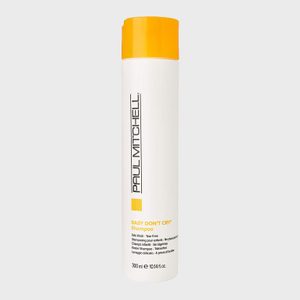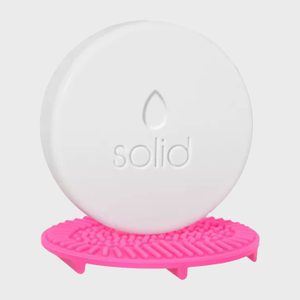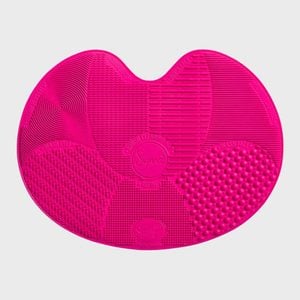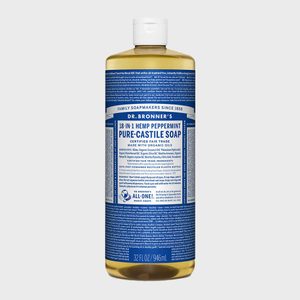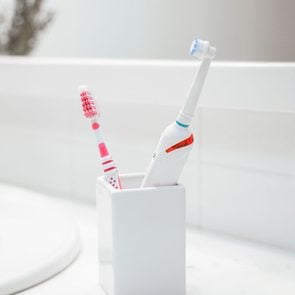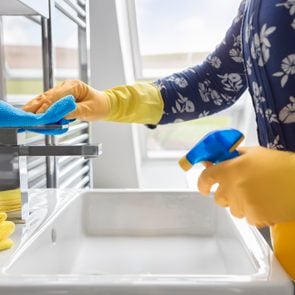How to Clean Your Makeup Brushes Quickly and Easily
Updated: Apr. 12, 2024
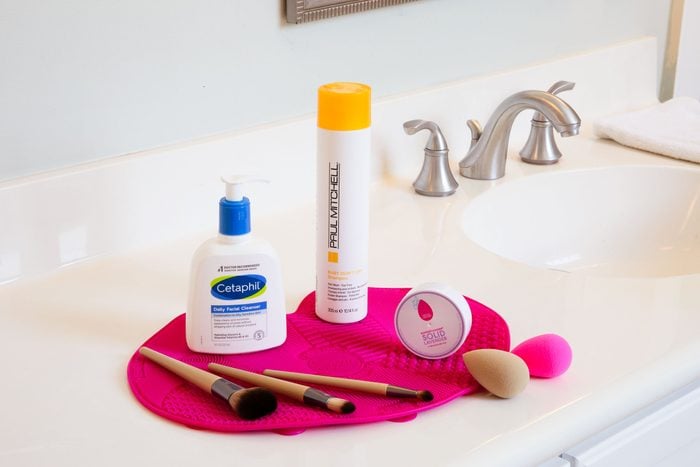
Not sure how to clean your makeup brushes? Follow these step-by-step directions for gorgeous skin and brushes that last.
Our editors and experts handpick every product we feature. We may earn a commission from your purchases.
You probably diligently cleanse your skin and faithfully replace your mascara when it starts to get clumpy … but when was the last time you cleaned your makeup brushes? Unless you’re a professional makeup artist, it might have been months or even (yikes!) years since you last dusted off those brushes and gave them a thorough deep-clean. But this should be part of your regular cleaning schedule, right alongside cleaning your hairbrush, cleaning the shower and cleaning everything else in your home. It’s not just a matter of quickly rinsing them in water, though: You need to know how to clean your makeup brushes properly if you want them to work well and last.
And this task isn’t just (ahem) cosmetic. “Keeping your makeup brushes clean prevents them from fostering too much microbial growth, which can create havoc with your skin’s microbiome,” says makeup artist Matthew Waitesmith, founder of makeup-brush brand Artís.
Luckily, the cleaning process isn’t complicated, though you do need to follow a few specific steps and use the right makeup brush cleaners. We got the scoop from makeup artists on how to clean your beloved beauty tools quickly and easily so they’ll go the distance.
Get Reader’s Digest’s Read Up newsletter for more cleaning, travel, tech, humor and fun facts all week long.
Why do you need to clean your makeup brushes?
When your makeup brush touches your skin, it picks up dirt, oil and bacteria. If you don’t clean your brushes regularly, this debris will quickly accumulate, explains Tracy Ftacek, founder of the Pretty Convenient app, which provides on-location makeup and hairstyling services in the Midwest. This is problematic for a few reasons.
For starters, it interferes with makeup application. “A clean makeup brush ensures you will achieve the most optimal result,” Ftacek says. “You are maximizing the purpose and design of each tool and allowing the cosmetic product to adhere properly to your skin.” Whether it’s an eye-shadow brush or a foundation brush, your makeup will go on more smoothly if the brush is clean and if residual makeup isn’t caked onto it. That’s just one of the makeup tips pros know.
Even more important? The health of your skin. “A dirty makeup brush harbors bacteria and dead-skin cells,” says Ftacek. “A properly sanitized brush will prevent the transfer of this debris and bacteria.” The same goes for old makeup, by the way.
What happens if you don’t clean your makeup brushes?
Imagine repeatedly swirling a brush full of bacteria and dirt across your skin, patting sebum and acne-causing microorganisms into your face. Gross, right? That’s what happens when you repeatedly use a brush that’s not clean. “Makeup brushes go back and forth between our powders or creams and our skin. Brush hair is porous, and without regular cleaning, the residual makeup, oil, dirt and debris builds up within the hairs,” says celebrity makeup artist Terri Bryant, founder of Guide Beauty. “That buildup can clog our pores and cause breakouts or other skin irritations.”
Aside from damaging your skin and even making you look older, not cleaning your brushes will also damage them. “It will cause the product to build up on the bristles and be much harder to clean if left unattended over time,” explains makeup artist Marcia Williams, founder of Embellish Beauty Concepts. “Great brushes can be expensive, so it’s critical for you to implement a brush-cleaning routine into your schedule.”
What should you use to wash your makeup brushes?
There are multiple ways to clean your makeup brushes. Many pros rely on a gentle shampoo such as baby shampoo because it won’t damage brush hairs. Makeup artist Natasha Moor, founder of Natasha Moor Cosmetics, also says it will leave the least amount of residue on brushes. Ftacek recommends Paul Mitchell Baby Don’t Cry Shampoo: “It is one of the most gentle and cruelty-free options available.” For more heavy-duty jobs, you can use a liquid soap that strips oil, such as dish soap.
Of course, you can also purchase something specially designed to tackle your brushes. “The most ideal products to use for cleaning makeup brushes are those dedicated specifically for makeup-brush and tool cleaning,” says Ftacek. “BeautyBlender Brush Cleanser is one product we use and recommend in our artist kits and for our clients.”
Another option is a brush-cleaning mat, which is designed to remove residue. Bryant is partial to Sigma Spa Brush Cleaning Mat. “The silicone mat fits neatly into the base of your sink,” she says, “and it has different patterned grooves to remove residual makeup and anything else caught in the brush hairs.”
Interested in using a homemade or natural cleaning option? Bryant recommends Dr. Bronner’s Pure-Castile Liquid Soap. Another tip is to look for a cleaner with words like “gentle” on the label, or for the shortest ingredient list possible.
Should you avoid certain products when cleaning your makeup brushes?
Yes. Harsh kitchen and bathroom cleaners have no place on products that touch your face and go near your eyes. And definitely steer clear of anything that contains bleach or lye. While you’re at it, don’t fashion a homemade concoction with lemon juice or any citrus ingredients, since they can burn your eyes. When cleaning your brushes, opt for the most gentle products possible.
What’s the best way to clean makeup brushes?
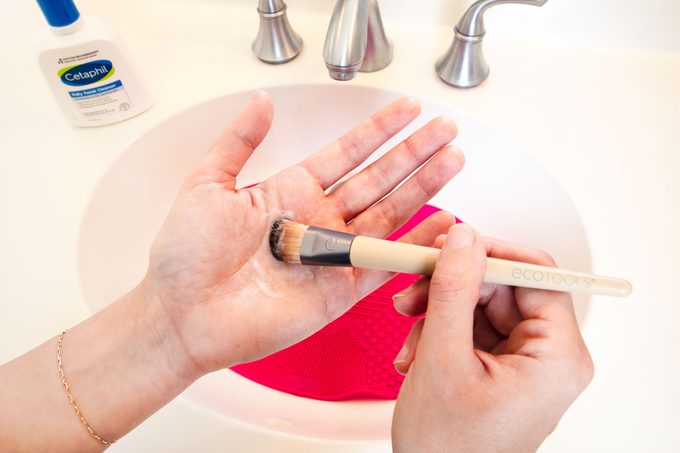
Now for the information you’ve been waiting for: how to clean your makeup brushes properly. It’s easy—we promise! Just follow these steps.
- If you’re using liquid soap, start by dampening the bristles of your brush.
- Next, add a drop of the soap in the palm of your hand, and swirl the brush around until makeup begins to release.
- Repeat until the brush is clean.
- Rinse out the soap.
- Gently squeeze out excess water, and reshape the brush head.
- Lay the brush flat to dry on an absorbent towel, avoiding pooling water by the handle. Bryant recommends letting the brush hair hang over the edge of the sink; if space is an issue, you can also use a drying rack.
Pro tip: Don’t submerge your brushes in a sink full of water or wet the metal cap (which is technically called the ferrule), says Moor. “If you do this, the brushes will start to deteriorate and have a much shorter life,” she explains. “Rather, clean them manually in a little bowl or on the back of your hand.”
What’s the best way to clean makeup sponges?
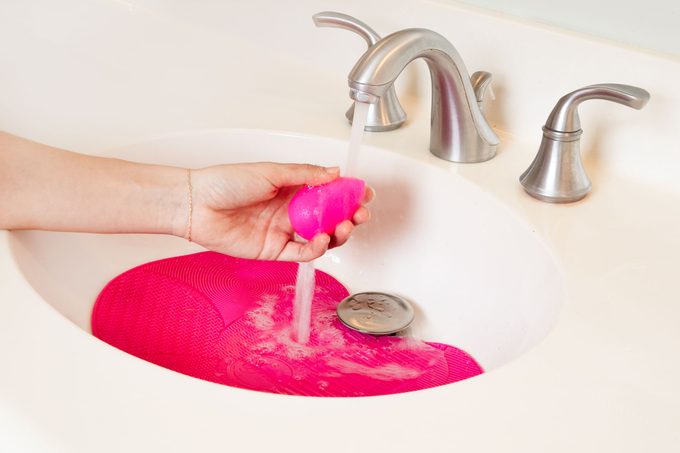
Many makeup artists recommend using a facial cleanser to clean makeup sponges. Since it’s gentle enough for the skin on your face, it won’t damage your makeup sponges. The good news is that it doesn’t have to be the pricier product you use every day: Feel free to go with something cheaper, or even use a cleanser you didn’t love but didn’t have the heart to throw out. Either way, this is a good place to save money.
- Wet the makeup sponge with tepid water.
- Put a pea-sized amount of cleanser in the palm of your hand.
- Wash under water, gently squeezing the makeup sponge to loosen any stuck on product. Do not wring out the sponges; just apply enough pressure to clean them.
- Keep rinsing until the water runs completely clear.
- After cleansing, gently squeeze your sponge in a clean towel to remove most of the water.
To clean a BeautyBlender or other sponge that has some wear and tear or slight makeup staining, Kenna Ehman, co-owner of Kenna Kunijo, suggests a different technique. She puts the sponge in a bowl filled with hot water and a little bit of Dawn dish soap. “The Dawn breaks up the foundation all the way through so well!” she says. “Squeeze [the sponge], pump the soapy water through, and repeat until it’s clean and clear.”
With either technique, you can use your clean makeup sponge as soon as you need it, says Moor. There’s no need to wait for it to dry fully, and it’s even better if it doesn’t, since many makeup products, including foundation and BB cream, work better when applying with a damp sponge.
How often do you need to clean your makeup brushes?
Williams recommends deep-cleaning your brushes weekly if they’re used regularly, or every other week for brushes used less frequently. And while Ftacek agrees that once a week is standard, she explains that frequency of use, as well as your skin issues, should dictate your cleansing schedule. “A general rule of thumb is once a week unless you experience preexisting skin challenges—then twice a week would be recommended,” Ftacek says. Of course, things are a little different for professionals. Makeup artists sanitize brushes between every client to ensure that everyone stays safe.
Ftacek also recommends having two sets of brushes—one for colorful makeup and one for your more natural products. This prevents unwanted color transfer and ensures that you won’t have to clean your brushes multiple times a week if you want to switch things up. “Once cleaned,” she advises, “storing them in separate makeup-brush cases or rolls helps you to know what needs to be sanitized at the end of the week.”
As for sponges, the rules are a little different. Moor thinks even non-professionals should clean their sponges with warm water after every use. This simple step goes a long way in preventing contamination, helping them last longer and allowing them to work more effectively.
When should you replace your makeup brushes?
Have your makeup brushes seen better days? If the bristles are crimped, broken, discolored or shedding, it’s time. “Makeup brushes should be replaced if the bristles start to shed or have discoloration,” says Williams. “If you experience shedding, then there’s a good chance that the glue holding the bristles has been compromised.”
Bryant agrees. “The life span of a makeup brush can vary greatly, but with proper care and cleaning, good makeup brushes can last for years. A brush that starts shedding or doesn’t bounce back to its original shape after it is washed and dried is past its prime and ready to be replaced.”
Sponges can have a shorter life span than makeup brushes, so expect to replace them about every three months. If you have skin that’s prone to acne or breakouts, you may have better luck with single-use sponges. Ask your dermatologist, to be on the safe side.
Ultimately, if you’re taking great care of your brushes, sponge and other beauty tools, they should last for a good, long time, even with frequent use. “Within my artist kit, I possess several makeup brushes that have lasted me for years with proper maintenance and care,” Ftacek says.
Now that you know how to clean makeup brushes, find out which things you should be cleaning every day.
Additional reporting by Rachel Weingarten.
Sources:
- Matthew Waitesmith, makeup artist and founder of makeup-brush brand Artís
- Tracy Ftacek, founder and owner of the Pretty Convenient app
- Terri Bryant, celebrity makeup artist and founder of Guide Beauty
- Marcia Williams, founder of Embellish Beauty Concepts
- Natasha Moor, makeup artist and founder of Natasha Moor Cosmetics
- Kenna Ehman, co-owner of Kenna Kunijo

